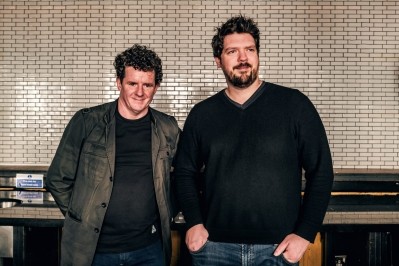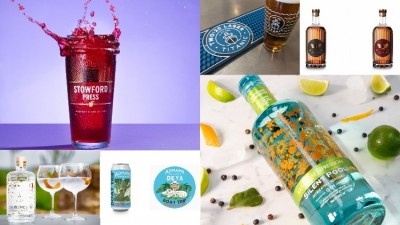INTERVIEW
Education key to changing beer perceptions

Sharp’s Beer Sommelier Ed Hughes explained the industry needed to focus on sharing “the basics” of beer education, in a similar fashion to that of different types of wines or spirits, to bring it “to the masses”, starting with those entering the hospitality sector.
He said: “I was lucky to be supported all the way through. I worked in hospitality from the age of 14, generally front of house, and I was talking about spirits from Diageo and wine from the wine merchants and [everything else], but no one told me anything about beer.”
Hughes added the nation’s beer industry could look to other countries on how to “respect” the category more.
“Before I started working at the brewery, I went on a trip to Brussels, and that was my beer epiphany.
“It wasn't just about a selection of beers, but it was also about the respect and romanticism that the Belgians have for beer.”
Sharp’s retail and hospitality manager Sam Lyne added operators should “remember” the nation’s beer heritage and be “proud”, showcasing different beers in the correct glassware, for example, to make sure everyone shows the category “more respect”.
Gap in the market
Lyne continued: “There's a gap in the training market in hospitality to talk about beer. Like Ed said, I remember doing the whiskey trainings and the wine trainings, but we need somebody to come in at that first point of contact for anyone coming into the hospitality trade to get excited about beer and want to learn more.
“There's a big gap between your average beer drinker and somebody that's a beer enthusiast or a beer sommelier, the gap in between is massive and we need to bridge that to get everyone's basic knowledge of beer a bit better and respect it more.”
Hughes echoed this, stating most beer drinkers don’t know the differences between each variant, compared with wine drinkers, for example, who archetypally discuss regions or grape varieties when talking about the category.
He said: “We've got very opinionated beer drinkers that will only drink craft or cask ale but possibly might not know the basics”.
When looking to change perceptions of different beer styles, Hughes added pubs can play a large part in this by using things like fonts to change people’s “perceptions”, particularly with cask ale.
He continued: “People will sometimes see a beer engine and say, ‘I don't drink that because it's warm and flat’ because of prejudice.
“The cask category needs help at the moment, that's where the education comes in.”
Hughes added people are “scared of cask” as the category was shrouded in “mystery”.
“It’s about getting people to ask questions. For so long, people have just drunk beer and thought ‘I like lager and that's what I like’, they've never actually sat down and thought about what makes a lager or what ingredients go into it”, Lyne added.
Upselling technique
Looking for ways to ensure the category is bought to the forefront, Hughes explained operators could look to food pairings in a similar fashion to that of wine in a bid to coax consumers to explore different types of beer.
To do this, the beer sommelier urged publicans to talk to brewers and suppliers for advice and look to food pairings to provide a more experiential offering.
He added: “Pubs and [other hospitality] outlets need to ask more from their breweries and suppliers, without them asking, brewers are going to behave like brewers have behaved for a very long time.
“We proactively talk about beer and food, we worked on a cookbook back in 2018, because it can be really good upselling technique as well.”
Hughes further advised operators not to produce a “full beer menu” overnight, but to start off slow and add one or two beer recommendations to menus with the option to have a third, half or a pint, for example, and build on this.
In addition, despite wine having “dominated” the food pairings category for some time, Hughes stated it wasn’t a case of “beer versus wine”, but a case of educating beer drinkers.
“For things like fish and chips, try a helles or a pilsner, with a steak and ale pie or braised beef, have it with [an ale].
“Just start drip feeding and signposting it to people. It could be on the specials board or written suggestions on a menu, then it's also no extra pressure for front of house staff.
“Pubs can even incorporate any beer wastage into an ingredient, like a beer batter. Food led outlets are probably more tooled up than others to begin with”, he continued.
Enriching people
Lyne added this also provided an opportunity to recruit drinks from other categories, who wouldn’t typically associate beer with food pairings.
He said: “We know it works. Again, it’s that perception with people looking at beer and thinking ‘I wouldn’t have a three-course dinner and pair a different beer with course’, but you really can.”
Moreover, both Lyne and Hughes championed beer education as a tool to help ease the recruitment crisis within the sector as well helping with footfall.
Hughes said: “It's the hardest it's ever been to retain staff. So hopefully, by enriching people with an education, operators can then retain the staff a little bit longer as well, which will help the category but also service the industry, because it needs it more now than ever.”
In addition, Hughes said the sector needed to “speak more outwardly” about cost increases across the board to bolster education about both the wider hospitality industry and the beer category.
He added: “The cost-of-living has become a phrase, but without real-life examples, people don't realise [how much costs have increased].
“Hospitality is a massive employer. Acknowledging it’s a serious trade is important. There isn't a golden bullet, unfortunately, but we need to keep on talking about it.
“We all need to keep on talking about it to encourage support for the industry, because otherwise we see so many pubs closing. We’re stronger together.”







